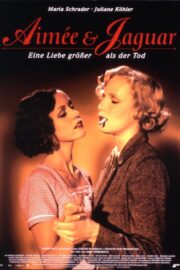Aimée & Jaguar
Germany, 1943. Lilly Wust is in her late twenties, married, and a mother of four children. Her husband is a soldier in the war. One day, Lilly meets the self-confident Felice. The two become friends, but Lilly senses from the start that Felice wants more from her than mere “friendship.”
At first, Lilly reacts dismissively to Felice’s courtship. Eventually, however, a passionate love develops between the two women. Even when Lilly, who is married to a convinced Nazi, learns that Felice is Jewish and belongs to a resistance group, she stands by her lover. She divorces her husband and takes Felice into her apartment. For as long as possible, the two women repress the brutal German reality of life at that time and all the impending dangers. Until the Gestapo shows up at their apartment in August 1944.
For one of them, this forbidden love becomes the decisive experience of her life. For her friend, an intrepidly flamboyant Jewish woman working for an underground organization, it is a game of fire — but also her last chance to wrest a fulfilled piece of life from the murderous regime.
Cast
- Felice Schragenheim - Jaguar
- Maria Schrader
- Lilly Wust - Aimée
- Juliane Köhler
- Ilse
- Johanna Wokalek
- Klärchen
- Heike Makatsch
- Lotte
- Elisabeth Degen
- Günther Wust
- Detlev Buck

Aimée & Jaguar
Max Färberböck
- Fiction
- Production Country / Year
- 1999
- Language
- dt. OF ohne UT
- Format
- DCP, Color, 121min
1.78:1 (16:9), Discrete 5.1
Director & Crew
Max Färberböck
Born in 1950 in Degerndorf. Worked in international theaters and studied at the University of Television and Film Munich. Active as a screenwriter and director.
Filmography
| 1999 | Aimée & Jaguar | Spielfilm | 2023 |
| 2001 | Jenseits | Fernsehfilm | |
| 2003 | September | Spielfilm | |
| 2008 | Anonyma – eine Frau in Berlin | Spielfilm | |
| 2009 | Bella Block: Vorsehung | Fernsehfilm | |
| 2010 | Sau Nummer Vier. ein Niederbayernkrimi | Fernsehfilm | |
| 2013 | Paradies 505. ein Niederbayernkrimi | Fernsehfilm | |
| 2014 | Tatort: am Ende des Flurs | Fernsehfilm | |
| 2015 | Tatort: der Himmel ist ein Platz auf Erden | Fernsehfilm | |
| 2016 | Tatort: mia san jetz da wo’s weh tut | Fernsehfilm | |
| 2018 | Tatort: ich töte niemand | Fernsehfilm | |
| 2019 | Ich brauche euch | Fernsehfilm | |
| 2020 | Tatort: die Nacht gehört dir | Fernsehfilm | |
| 2022 | Tatort: warum | Fernsehfilm |
“At that time, in the context of AIMÉ AND JAGUAR, I was asked again and again, ‘Isn’t this really a film that should have been made by a woman?’ And I answered with conviction: ‘No.’ And honestly, what I dream of is that this distinction no longer exists. For me, Max Färberböck was the right director for this film. There are many scenes that I like, but when asked what scene makes up the soul of the film for me, it’s the love scene [...] A lesbian love story brought to the screen and portrayed no differently than a heterosexual one. And that is extraordinary to this day.”
- Make-up
- Gerlinde Kunz
- Music Composer
- Jan A.P. Kaczmarek
- Producer
- Günter Rohrbach
- Hanno Huth
- Gerhard von Halem
- Production Designer
- Katja Schmidt
- Writer
- Rona Munro
- Sound
- Benjamin Schubert
- Editor
- Barbara Hennings
- Costume Designer
- Barbara Baum
- Director of Photography
- Tony Imi